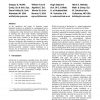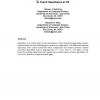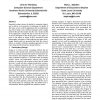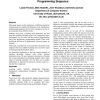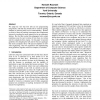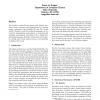SIGCSE
2002
ACM
15 years 25 days ago
2002
ACM
Pedagogy of large lecture classes has traditionally focussed on deemphasizing the problems their size creates. This approach has yielded valuable practical advice for instructors....
103
click to vote
SIGCSE
2002
ACM
15 years 25 days ago
2002
ACM
As the complexity and variety of computer system hardware increases, its suitability as a pedagogical tool in computer organization/architecture courses diminishes. As a consequen...
SIGCSE
2002
ACM
15 years 25 days ago
2002
ACM
154
click to vote
SIGCSE
2002
ACM
15 years 25 days ago
2002
ACM
Empirical evidence shows the ability for computer technology to deliver on its promises of enhancing our quality of life relies on how well the application fits our understanding ...
121
click to vote
SIGCSE
2002
ACM
15 years 25 days ago
2002
ACM
We present our experiences using the RoboCup soccerserver simulator and Biter, our own agent platform, for the teaching of a graduate multiagent systems' class. The RoboCup s...
114
click to vote
SIGCSE
2002
ACM
15 years 25 days ago
2002
ACM
In our approach to the Programming Languages course, formal models are integrated as a thread that pervades the course, rather than as a one of many topics that is introduced and ...
116
click to vote
SIGCSE
2002
ACM
15 years 25 days ago
2002
ACM
This paper reports on the implication of different preferred learning styles on students'performance in the introductory programming sequence and on work in progress on how t...
SIGCSE
2002
ACM
15 years 25 days ago
2002
ACM
A course that surveys state-of-the-art microprocessors offers an excellent forum for students to see how computer architecture techniques are employed in practice and for them to ...
SIGCSE
2002
ACM
15 years 25 days ago
2002
ACM
We adopt the view that CS1 labs are not programming assignments, and that they should not be used for grading students or assessing their level of understanding. Instead, we think...
SIGCSE
2002
ACM
15 years 25 days ago
2002
ACM
We describe a course for non-majors that teaches computer science concepts and programming by creating simple animations and building 2D and 3D virtual worlds. Students work with ...

